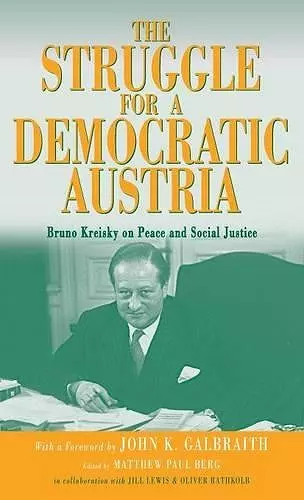The Struggle for a Democratic Austria
Bruno Kreisky on Peace and Social Justice
Format:Hardback
Publisher:Berghahn Books, Incorporated
Currently unavailable, and unfortunately no date known when it will be back

Bruno Kreisky (1911-1990) is undoubtedly the most prominent and influential politician to emerge in postwar Austria. For some thirty years, he helped to shape his country's politics and raise its status in the world, first as secretary of state, then as leader of the opposition Social Democratic Party and as foreign minster, and finally as chancellor from 1970 to 1983. During his long tenure of public office, Austria achieved unprecedented levels of prosperity; he promoted electoral and educational reform and weathered the occasional scandal.
His analytical mind and intelligence were much appreciated by statesmen in East and West as well as in the academy, as were his deeply felt humanism, integrity, untiring advocacy of tolerance and social justice, and his earnest sense of responsibility. These won him the trust and admiration of the leading international figures of his era, including Tito, Nehru, Nasser, De Gaulle, and Pope John XXIII. His international connections and his position as leader of a non-aligned state allowed him to assume the role of honest broker in international peace, human rights, and development initiatives. His stature enabled him to play an active part in the promotion of the Arab-Israeli dialogue and pave the way for President Jimmy Carter's mediation of the Israeli-Egypt peace accord through his close relationship with Sadat. As a result of such activity, Kreisky was respected and praised by every U.S. administration from Kennedy to Brezhnev, despite his support for the containment of Soviet communism.
This annotated volume - a condensed version of the three volumes of the German edition and compiled by Jill Lewis, University of Wales, and Oliver Rathkolb, Director of the Stifung Bruno Archiv - gives a fascinating insight into Kreisky's life and his many activities. He lets us participate in the big decisions in which he was involved and shares his encounters with other world leaders of this time. Austria be a small country, but it produced at least one major leader whose lively and immensely readable account and wisdom many readers will find inspiring.
“A highly useful volume… The editors' extensive notes enrich the book greatly, especially for scholars knowledgeable about Austria's recent history and able to appreciate citations to books and documents in German.”• Journal of Modern History
“[Kreisky's] memoirs are engaging… [they] are a welcome addition to works recognizing not only Austria's role in history, but also the value of autobiography to historical and political analysis.”• The International History Review
“[This book offers] plenty of food for thought, positive and negative, for anyone with a serious interest in postwar Austria… A good read.”• Central European History
“[Kreisky] fostered an 'active neutrality' for his nation… Mr. Kreisky, who was widely popular among Austrians, stressed European dJtente and 'active neutrality' for Austria while he negotiated an association agreement with the European Economic Community, and mad Vienna a leading center of international forums, including summit talks. He also accelerated Austria's policy of aiding Soviet Jews in migrating to Israel and elsewhere.”• The New York Times
“His distinguished contribution to Austrian public life was matched by a dynamic role in the international arena where, in helping to tackle some of the most difficult issues of our time, he displayed great imagination and courage as well as an unflagging commitment to the ideals expressed in the United Nations charter.”• Javier Perez de Cuellar, former Secretary General of the UN
“While heading the government from 1970 to 1983, Mr. Kreisky strode the international stage as an advocate of Palestinian self-determination, European dJtente and North-South dialogue. In 1979, he became the first Western leader to receive the Palestine Liberation Organization leader. Yasser Arafat. Mr. Kreisky played a key role in helping Austria, occupied by the Soviet Union, the United States, France, and Britain after World War II, regain its independence on the condition that I pledged permanent neutrality. As a Foreign Minister undersecretary, he was a member of the government negotiating team that flew to Moscow in 1955 to conclude the treaty by which the occupation ended.”• International Herald Tribune
ISBN: 9781571811554
Dimensions: unknown
Weight: 835g
565 pages